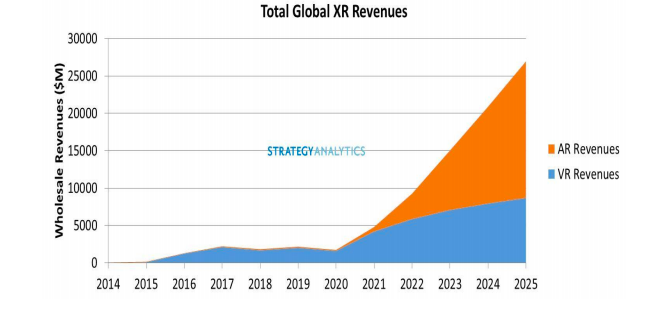XR market will experience strong growth from 2021 onwards, says Strategy Analytics
Strategy Analytics predicted that, despite a challenging year, the XR market will experience strong growth from 2021 onwards. Specifically, the report anticipates XR shipments to grow six-fold from 2020 to 2025 with revenues reaching $27B, even as COVID-19 will prove to have a “significantly negative effect” on the XR market this year.
The 2020 setbacks include the decline of both shipments and revenues by just over 20% YoY, as well as the delayed launch of smartphone-tethered AR headsets. This, added the firm, effectively delayed its earlier anticipated growth in a consumer market for dedicated AR devices by a year.
In fact, the firm goes as far as stated that 2020 was posed to be “the” year dedicated AR headsets. But, the unforeseen pandemic disrupted all that.
However, once the smartphone-tethered AR headsets do hit the market, it is expected that growth in AR headsets from the mid and low tier will follow. In addition, AR Contact Lenses reached the market in 2020, and this new product category has been added to the forecast.
Even as the XR market struggles under COVID-19, the technology is also positioning itself as a solution during these tough times, which perhaps isn’t so surprising when you consider that the best way to avoid getting sick and spreading the virus is by staying home, suggesting that we need to find other ways to meet with people and to experience things.
For instance, Dutch independent research organization TNO (Toegepast Natuurwetenschappelijk Onderzoek) is working on a platform for XR that they say could prove beneficial during the pandemic by connecting coworkers for virtual meetings and more importantly, delivering expertise virtually.
Right now, various sectors, such as healthcare, education and IT are experience a lack of on-site expertise as they try to manage this crisis. But, according to the Dutch organization’s lead scientist Omar Niamut, XR technology can go a long way in solving this problem.
“This scarcity can be overcome by XR technology,” said Niamut. “For example, an elderly person can have a doctor’s consultation without having to leave his or her home. You can involve an expert [in many fields] remotely, so that others feel you are really there, without having to bridge the physical distance.”
And this is just one application for extended reality technology. BBC has tested the VR as a way to provide 360 degrees view of FIFA 2018 and Korean Boy Band BTS has already experimented with AR during their live stadium shows to amplify fan engagement.

